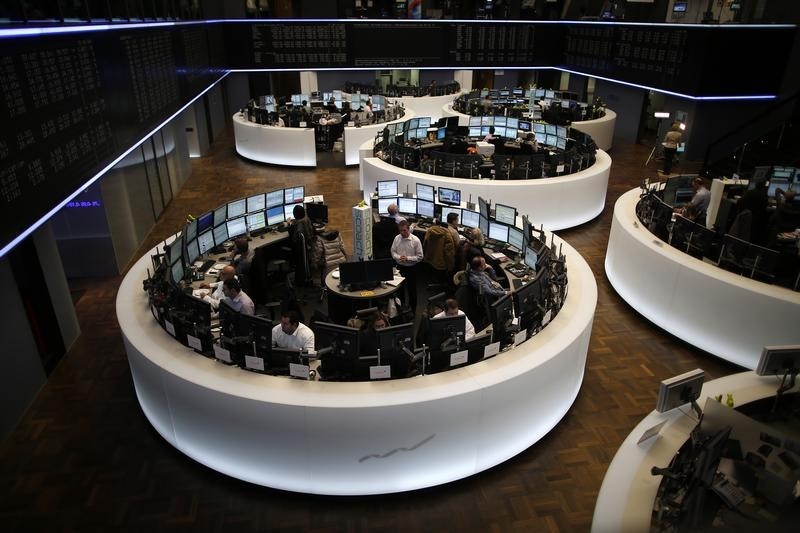Trump-Zelensky meeting ahead, Fed rate outlook in focus - what’s moving markets
* U.S. stock futures fall as much as 4.9%, Euro Stoxx 8.3%
* MSCI ACWI stock index down 19% from peak, on cusp of bear
market
* Markets expect ECB to cut rates despite side-effects
worries
* Fed futures fully price in 1% rate cut this month
* Safe-haven assets soar, but off recent highs
By Hideyuki Sano
TOKYO, March 12 (Reuters) - Financial markets reeled on
Thursday as stocks dived and oil slumped after U.S. President
Donald Trump took the dramatic step of banning travel from
Europe to reduce the impact of the coronavirus, threatening more
disruptions to trade and the world economy.
U.S. S&P 500 futures ESc1 plummeted as much as 4.9% and
last traded down 3.6%, a day after the S&P 500 .SPX lost
4.89%, putting the index firmly in a bear market territory,
defined as a 20% fall from a recent top.
Euro Stoxx 50 futures STXEc1 plunged 8.3% to their lowest
levels since mid-2016. They were last down 6.9% while investors
rushed to safe-haven assets from bonds to gold to the yen and
the Swiss franc.
"The travel ban from Europe has definitely taken everyone by
surprise," said Khoon Goh, head of Asia Research at ANZ in
Singapore.
"Already we know the economic impact is significant, and
with this additional measure on top it's just going to multiply
the impact across businesses. This is something that markets had
not factored in...it's a huge near-term economic cost."
In Asia, MSCI's broadest index of Asia-Pacific shares
outside Japan .MIAPJ0000PUS fell 3.2% and touched its lowest
level since early 2019, while Japan's Nikkei .N225 crumbled
5.3%.
Trump announced on Wednesday the United States will suspend
all travel from Europe, except from the United Kingdom, to the
United States for 30 days starting on Friday. However, Trump
said trade will not be affected by the restrictions.
He also announced some other steps, including instructing
the Treasury Department to defer tax payments for entities hit
by the virus.
"For those who had been hoping for measures to offset likely
fall in consumption, it was a disappointment," said Hirokazu
Kabeya, chief global strategist at Daiwa Securities. "There was
no talk of payroll tax cuts."
In the money market, traders further raised their
expectations of an aggressive U.S. rate cut, underlining the
fears in markets of a deepening economic downturn even as the
Federal Reserve had stepped in last week with an emergency
easing.
Fed fund rate futures 0#FF: are now pricing in a large
possibility of a 1.0 percentage point cut, rather than 0.75
percentage point, at a policy review on March 17-18.
PANDEMIC
The World Health Organization (WHO) described the outbreak
as a pandemic for the first time on Wednesday though an official
said the move does not change the agency's response.
The highly infectious disease that virtually shut down most
parts of China for much of February is spreading rapidly in
Europe and increasingly in the United States, disrupting many
corners of life from education to sports, entertainment and
dining.
The U.S. National Basketball Association was the latest to
be hit by the pandemic as it announced it will suspend the
season until further notice. Investors worry how much of an effect economic policies can
have in turning around the global economy given the widespread
restrictions on daily life, travel and disruptions to
businesses.
A case in point was Britain, where the FTSE stock index
.FTSE hit near four-year lows as investors doubted whether the
$39 billion spending plan and the Bank of England's 0.5
percentage point rate cut announced on Wednesday would be enough
to counter the shock from the outbreak.
The British pound stood at $1.2816 GBP=D4 , near this
week's low.
"At this stage, we all need to take it on the chin and bear
it for a few months (in terms of economic disruption)," said
Cliff Tan, East Asian Head of Global Markets Research at MUFG
Bank in Hong Kong.
"Here in Hong Kong and China we have been through it and
know what's it like to shut down... I don't think the market has
fully caught on with how this disruptive this could be for the
economy."
Safe-haven assets were back in favour, though many of them
were still below recent peaks, which some market players suspect
reflects a desperate bout of profit-taking to make up for losses
suffered elsewhere.
Gold XAU= edged up 0.1% at $1,636 per ounce but still
stood well below Monday's high above $1,700.
The 10-year U.S. Treasuries yield fell 6 basis points to
0.760% US10YT=RR , though it is still more than 40 basis points
above a record low of 0.318% touched on Monday.
The two-year yield US2YT=RR fell 6 basis points to 0.438%,
but stood well above Monday's low of 0.251%.
In commodities, oil prices were hit by intensifying price
war between Saudi Arabia and Russia, on top of fears of sharp
slowdown in the global economy.
Saudi Arabia promised to raise oil output to a record high
in its standoff with Russia.
The United Arab Emirates followed Saudi Arabia in promising
to raise oil output to a record high in April. U.S. West Texas Intermediate (WTI) crude CLc1 shed 4.9% to
$31.36 per barrel.
In the currency market, the dollar slid against the
safe-haven yen and the Swiss franc.
The U.S. currency fell 1.0% to 103.48 yen and lost 0.5% to
0.9335 franc CHF= .
The euro traded at $1.1307 EUR= , up 0.35% ahead of the
European Central Bank's policy meeting later in the day.
The ECB is all but certain to unveil new stimulus measures,
including new, ultra-cheap loans for banks to pass onto small
and medium-sized firms. Markets have priced in a 10 basis point cut to its already
record low minus 0.50% policy rate though many policymakers have
said further cuts could be counterproductive because they hurt
bank margins to the point of thwarting lending.
